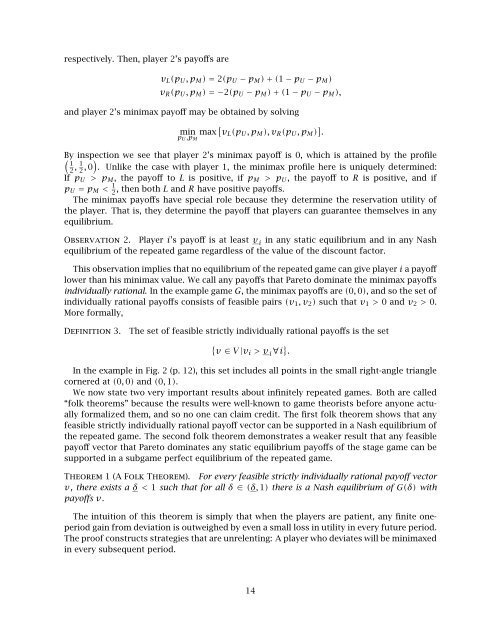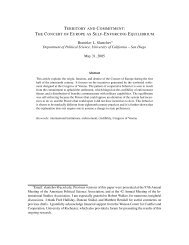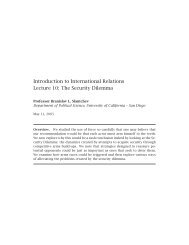Game Theory: Repeated Games - Branislav L. Slantchev (UCSD)
Game Theory: Repeated Games - Branislav L. Slantchev (UCSD)
Game Theory: Repeated Games - Branislav L. Slantchev (UCSD)
Create successful ePaper yourself
Turn your PDF publications into a flip-book with our unique Google optimized e-Paper software.
espectively. Then, player 2’s payoffs are<br />
vL(pU,pM) = 2(pU − pM) + (1 − pU − pM)<br />
vR(pU,pM) =−2(pU − pM) + (1 − pU − pM),<br />
and player 2’s minimax payoff may be obtained by solving<br />
min max<br />
pU ,pM<br />
vL(pU,pM), vR(pU,pM) .<br />
By inspection we see that player 2’s minimax payoff is 0, which is attained by the profile<br />
1 1<br />
2 , 2 , 0 . Unlike the case with player 1, the minimax profile here is uniquely determined:<br />
If pU > pM, the payoff to L is positive, if pM > pU, the payoff to R is positive, and if<br />
pU = pM < 1<br />
2 , then both L and R have positive payoffs.<br />
The minimax payoffs have special role because they determine the reservation utility of<br />
the player. That is, they determine the payoff that players can guarantee themselves in any<br />
equilibrium.<br />
Observation 2. Player i’s payoff is at least v i in any static equilibrium and in any Nash<br />
equilibrium of the repeated game regardless of the value of the discount factor.<br />
This observation implies that no equilibrium of the repeated game can give player i apayoff<br />
lower than his minimax value. We call any payoffs that Pareto dominate the minimax payoffs<br />
individually rational. In the example game G, the minimax payoffs are (0, 0), and so the set of<br />
individually rational payoffs consists of feasible pairs (v1,v2) such that v1 > 0andv2 > 0.<br />
More formally,<br />
Definition 3. The set of feasible strictly individually rational payoffs is the set<br />
<br />
v ∈ V |vi >vi∀i .<br />
In the example in Fig. 2 (p. 12), this set includes all points in the small right-angle triangle<br />
cornered at (0, 0) and (0, 1).<br />
We now state two very important results about infinitely repeated games. Both are called<br />
“folk theorems” because the results were well-known to game theorists before anyone actually<br />
formalized them, and so no one can claim credit. The first folk theorem shows that any<br />
feasible strictly individually rational payoff vector can be supported in a Nash equilibrium of<br />
the repeated game. The second folk theorem demonstrates a weaker result that any feasible<br />
payoff vector that Pareto dominates any static equilibrium payoffs of the stage game can be<br />
supported in a subgame perfect equilibrium of the repeated game.<br />
Theorem 1 (A Folk Theorem). For every feasible strictly individually rational payoff vector<br />
v, there exists a δ < 1 such that for all δ ∈ (δ, 1) there is a Nash equilibrium of G(δ) with<br />
payoffs v.<br />
The intuition of this theorem is simply that when the players are patient, any finite oneperiod<br />
gain from deviation is outweighed by even a small loss in utility in every future period.<br />
The proof constructs strategies that are unrelenting: A player who deviates will be minimaxed<br />
in every subsequent period.<br />
14








